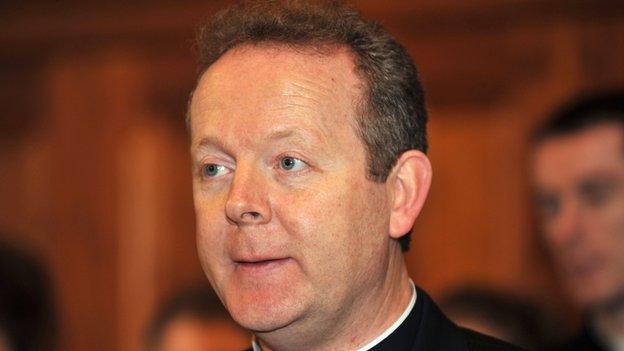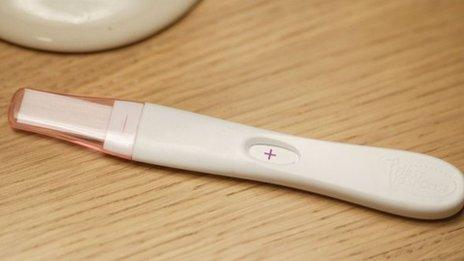Northern Ireland abortion laws case granted judicial review
- Published
The commission's application was granted at the High Court in Belfast, as Louise Cullen reports
The Human Rights Commission has been granted leave to pursue a judicial review of abortion law in Northern Ireland.
The commission's application was granted at the High Court in Belfast.
It is seeking a change to allow abortion in cases of rape, incest or "serious malformation" of a foetus.
At present, abortion is only legal if a woman's life is at risk or if there is a risk of permanent or serious damage to her mental or physical health.
The situation differs from the rest of the UK, because the 1967 Abortion Act has never been extended to Northern Ireland.
Stormont's Department of Justice (DoJ) has recently consulted the public on proposed changes to abortion law, asking if it should be allowed in other limited circumstances.
'Cruel'
The DoJ's consultation, which closed last month, recommended legalising abortion in cases where a foetus has been diagnosed with a lethal abnormality, meaning the baby is expected to die either in the womb or shortly after birth.
However, the department's consultation paper did not make recommendations for pregnancies resulting from rape or incest.
At Monday's hearing, lawyers for the Northern Ireland Human Rights Commission (NIHRC) told the High Court that the consultation's main focus was on lethal foetal abnormality and did not commit to making the changes it believes are necessary.
The NIHRC's barrister told the court that Northern Ireland's law on the termination of pregnancy, with women travelling to England to access services, amounted to cruel and inhuman treatment.
She argued that the current situation breaches rights to freedom from torture and inhuman and degrading treatment, discrimination and entitlements to privacy under the European Convention on Human Rights.
She told the judge there was a high level of support in Northern Ireland for decriminalising terminations in cases of rape and incest as well as lethal foetal abnormality .
A clear consensus also exists across Europe for woman to have those abortion rights, the barrister added.
"It can't be open to the [justice] minister to undermine the effect of the Human Rights Act by saying 'I'm consulting and therefore the courts should do nothing for a potentially prolonged period'," she said.
However, the DoJ's barrister told the court it had been inappropriate for the NIHRC to begin a "pre-emptive" legal challenge while the department's public consultation exercise was ongoing.
The barrister accused the NIHRC of bringing "aggressive legislation" against Justice Minister David Ford and said the consultation was a proper legislative process, with the correct checks and balances.
However, the judge said the case raised issues of considerable public importance, important enough to deserve a hearing.
He granted leave and listed the case for a three-day hearing in June.
Four other groups have requested to make submissions to the legal challenge - Alliance for Change, Precious Life, the Society for the Protection of Unborn Children and the Family Planning Association.
The judge advised those who had not yet done so to write to the court.
- Published31 January 2015

- Published15 January 2015

- Published10 December 2014

- Published8 October 2014

- Published18 August 2014

- Published19 November 2014
